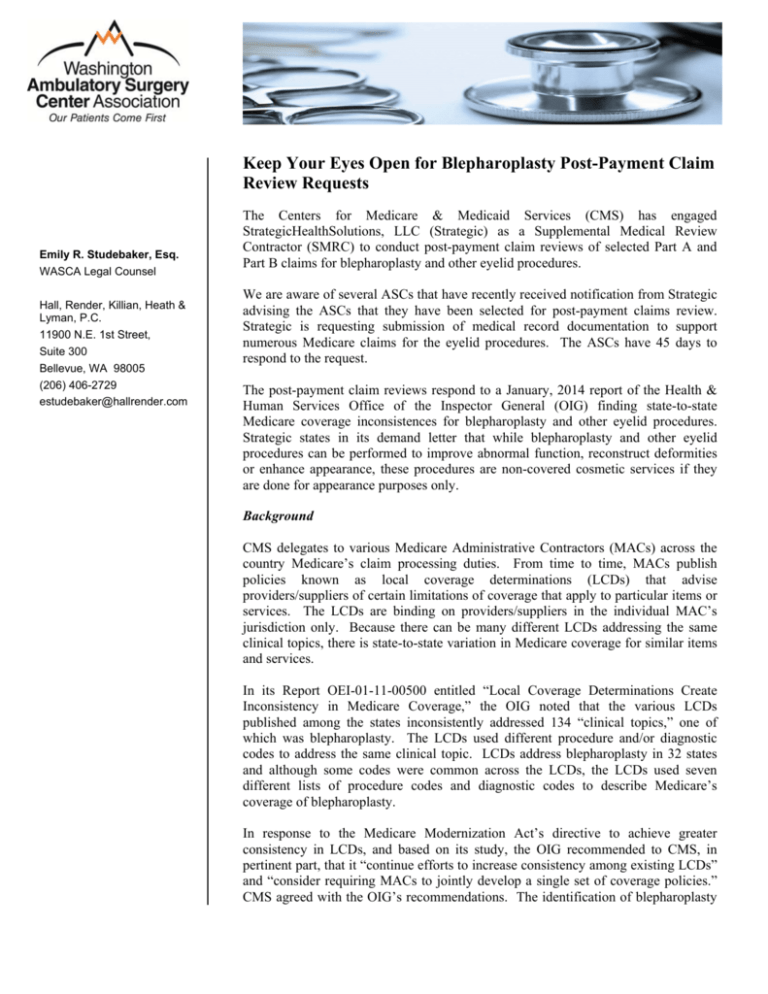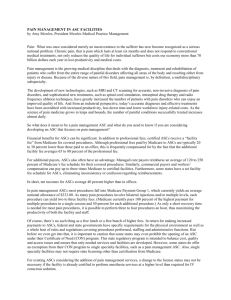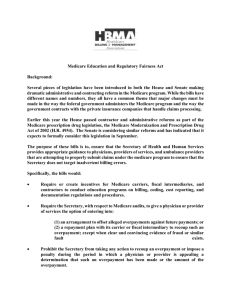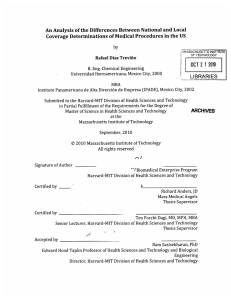
Keep Your Eyes Open for Blepharoplasty Post-Payment Claim
Review Requests
Emily R. Studebaker, Esq.
WASCA Legal Counsel
Hall, Render, Killian, Heath &
Lyman, P.C.
11900 N.E. 1st Street,
Suite 300
Bellevue, WA 98005
(206) 406-2729
estudebaker@hallrender.com
The Centers for Medicare & Medicaid Services (CMS) has engaged
StrategicHealthSolutions, LLC (Strategic) as a Supplemental Medical Review
Contractor (SMRC) to conduct post-payment claim reviews of selected Part A and
Part B claims for blepharoplasty and other eyelid procedures.
We are aware of several ASCs that have recently received notification from Strategic
advising the ASCs that they have been selected for post-payment claims review.
Strategic is requesting submission of medical record documentation to support
numerous Medicare claims for the eyelid procedures. The ASCs have 45 days to
respond to the request.
The post-payment claim reviews respond to a January, 2014 report of the Health &
Human Services Office of the Inspector General (OIG) finding state-to-state
Medicare coverage inconsistences for blepharoplasty and other eyelid procedures.
Strategic states in its demand letter that while blepharoplasty and other eyelid
procedures can be performed to improve abnormal function, reconstruct deformities
or enhance appearance, these procedures are non-covered cosmetic services if they
are done for appearance purposes only.
Background
CMS delegates to various Medicare Administrative Contractors (MACs) across the
country Medicare’s claim processing duties. From time to time, MACs publish
policies known as local coverage determinations (LCDs) that advise
providers/suppliers of certain limitations of coverage that apply to particular items or
services. The LCDs are binding on providers/suppliers in the individual MAC’s
jurisdiction only. Because there can be many different LCDs addressing the same
clinical topics, there is state-to-state variation in Medicare coverage for similar items
and services.
In its Report OEI-01-11-00500 entitled “Local Coverage Determinations Create
Inconsistency in Medicare Coverage,” the OIG noted that the various LCDs
published among the states inconsistently addressed 134 “clinical topics,” one of
which was blepharoplasty. The LCDs used different procedure and/or diagnostic
codes to address the same clinical topic. LCDs address blepharoplasty in 32 states
and although some codes were common across the LCDs, the LCDs used seven
different lists of procedure codes and diagnostic codes to describe Medicare’s
coverage of blepharoplasty.
In response to the Medicare Modernization Act’s directive to achieve greater
consistency in LCDs, and based on its study, the OIG recommended to CMS, in
pertinent part, that it “continue efforts to increase consistency among existing LCDs”
and “consider requiring MACs to jointly develop a single set of coverage policies.”
CMS agreed with the OIG’s recommendations. The identification of blepharoplasty
as a clinical topic with inconsistent coverage policies and blepharoplasty’s appeal as
a cosmetic procedure likely led to the current audit activity.
Types of Information Being Requested
ASCs that receive a post-payment claim review document request are being asked to
produce the following information on each case:
Claim bill
Physician order
History and physical
Relevant signs and symptoms to support indication for procedure
Photographs showing visual impairment
Visual field testing measurement with physician interpretation
Operative report
Results of pertinent diagnostic tests or procedures
Signatures/credentials of professionals providing services
Copies of any patient notices given, e.g., Advance Beneficiary Notice of
Noncoverage
Abbreviation keys or acronym keys used
Any other documentation to support services
Failure to respond within the allotted time will result in the provider’s/supplier’s
MAC initiating claims adjustments or overpayment recoupment actions for
undocumented services. In addition, all medical record entries must be properly
signed/authenticated or Strategic will not consider the unsigned proffered
documentation.
Practical Takeaways and Recommendations
ASCs should be on the look-out for blepharoplasty medical record review requests
and should strongly consider contacting experienced compliance counsel to fashion
the best response if they should receive one.
ASCs should review applicable blepharoplasty-related LCDs to ensure that they are
billing Medicare in compliance with the coverage provisions. Given that CMS
appears to be interested in auditing ASCs’ billing practices in this area, ASCs may
want to consider performing a self-audit to verify that billing is appropriate. To the
extent there is a determination that a non-covered cosmetic enhancement case
erroneously was billed to Medicare, the ASC should take prompt action to report and
repay the program in order to comply with the Affordable Care Act’s 60-day
repayment rule. This is essential in order to avoid liability under the False Claims
Act’s “reverse” false claim provision.
Since the post-payment claim review letters sent by Strategic identifying the items
CMS expects to see to justify the medical necessity of the procedure, ASCs may wish
to use this as a guideline to ensure their own documentation is complete.
Copyright © 2015 by Hall, Render, Killian, Heath & Lyman, P.C. All rights reserved.
This article is solely for educational purposes and is not intended as legal advice or as a
substitute for the particularized advice of your own counsel and should not be relied upon as
such, as the advice appropriate for you will be dependent upon the particular facts and
circumstances of your situation. The transmission or receipt of this information does not
create an attorney-client relationship.









